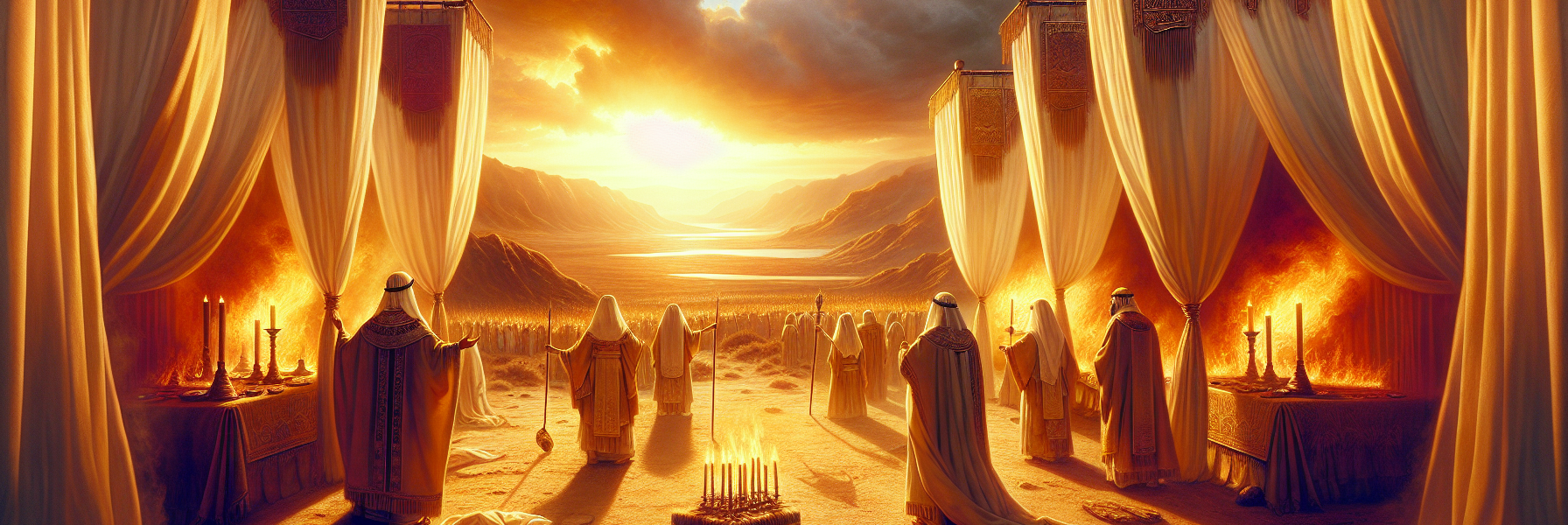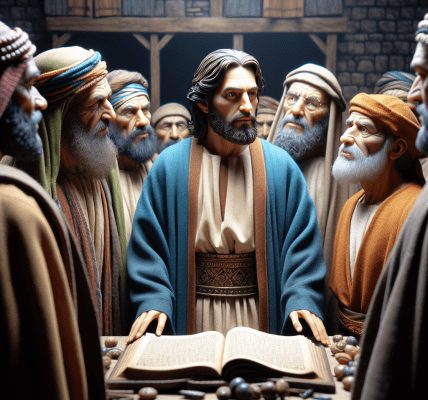**The Fire of Judgment: The Tragedy of Nadab and Abihu**
The morning sun rose over the wilderness, casting golden light upon the newly constructed Tabernacle, its fine linen curtains fluttering gently in the desert breeze. The air was thick with the lingering scent of burnt offerings from the previous day’s consecration—a day of joy, of divine approval, when the glory of the Lord had appeared before all Israel and consumed the sacrifices with holy fire. The priests, freshly anointed, still bore the sacred oil upon their brows, a mark of their high calling.
Among them were Aaron’s eldest sons, Nadab and Abihu. They had stood beside their father, had witnessed the consuming fire of God’s presence, and had felt the weight of their sacred duty. But as the new day dawned, a restless pride stirred within them. They had seen the power of the Lord, and yet, in their hearts, they desired to approach Him on their own terms.
“Brother,” Nadab said, his voice low but fervent, “yesterday we saw the fire of God. What if we were to offer an incense offering now, not as Moses commanded, but as we see fit? Would not the Lord be pleased with our zeal?”
Abihu hesitated only a moment before nodding. “We are priests, chosen by God. Surely He will accept our offering, even if we do not wait for the command.”
And so, with hearts full of presumption rather than reverence, they took their censers—fine vessels of bronze—and filled them with incense. But the fire they used was not the sacred fire from the altar, the fire that God Himself had kindled. Instead, they took common fire, perhaps from their own hearth, perhaps from the campfires of the Israelites. It was a small deviation, they thought. Did not all fire come from God?
Clad in their priestly garments, they strode toward the Holy Place, their censers smoking. The other priests watched, some in curiosity, some in unease. Moses, standing at a distance, turned his gaze upon them, his brow furrowing. Aaron, their father, opened his mouth as if to speak—but before any word could leave his lips, the presence of the Lord manifested with terrifying swiftness.
A searing blast of divine fire erupted from before the veil of the Tabernacle. It was not the gentle, consuming flame that had sanctified the sacrifices the day before—this was a fire of judgment, swift and unrelenting. The blaze engulfed Nadab and Abihu, their censers clattering to the ground as their bodies were consumed in an instant. The smell of burning flesh mingled with the incense, a horrifying testament to their transgression.
A stunned silence fell over the camp. The priests nearest to them recoiled in terror, their faces ashen. Aaron stood frozen, his heart torn between grief and the dreadful understanding of what had just occurred. His sons—his firstborn—lay dead before the Lord, struck down in their moment of rebellion.
Then Moses, his voice steady but heavy with sorrow, spoke the words that sealed the tragedy in divine truth: *”This is what the Lord has said: ‘Among those who are near Me, I will be sanctified, and before all the people I will be glorified.’”*
Aaron bowed his head, trembling. He understood. To serve a holy God was to obey without deviation, to approach Him only as He commanded. There was no room for human innovation, no place for prideful worship.
The bodies of Nadab and Abihu, still clad in their priestly garments, were carried outside the camp by their cousins, their faces covered in mourning. No lamentation was permitted, no outward show of grief that might suggest God had acted unjustly. The priests were commanded not to drink wine or strong drink when serving, lest their judgment be clouded as their brothers’ had been.
And so the day that had begun with the pride of unauthorized worship ended in the solemn fear of the Lord. The fire that had once sanctified now judged, a reminder that the God of Israel was not to be trifled with. The priests would never forget the cost of disobedience, nor would Israel. For the Lord is holy, and those who draw near to Him must do so with reverence—or not at all.




